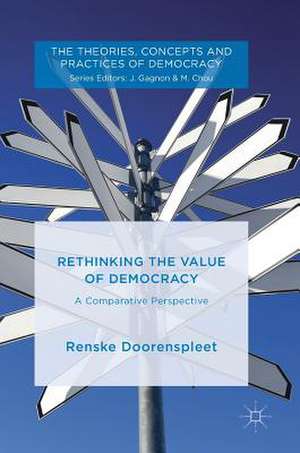Rethinking the Value of Democracy: A Comparative Perspective: The Theories, Concepts and Practices of Democracy
Autor Renske Doorenspleeten Limba Engleză Hardback – 2 aug 2018
This book is the first comprehensive analysis of the instrumental value of democracy in a comparative perspective. Based on extensive analyses of quantitative studies from different disciplines, it explores both the expected beneficial and harmful impact of democracy. Democracy’s reputation as delivering peace and development while controlling corruption is an important source of its own legitimacy. Yet, as this book acutely demonstrates, the arguments tend to be normatively driven interventions in ideologically charged policy debates. The book argues that we need neither a utopian framing of democracy as delivering all ‘good things’ in politics nor a cynical one that emphasizes only the ‘dangerous underbelly’ of this form of government. The author also raises critical questions about the value of the study of democracy: the choice for particular concepts and measures, the unknown mechanisms, and the narrow focus on specific instrumental values. This volume will be necessary reading for anyone interested in debates on democracy in the contemporary global context.
| Toate formatele și edițiile | Preț | Express |
|---|---|---|
| Paperback (1) | 418.64 lei 38-44 zile | |
| Springer International Publishing – 6 dec 2018 | 418.64 lei 38-44 zile | |
| Hardback (1) | 586.23 lei 6-8 săpt. | |
| Springer International Publishing – 2 aug 2018 | 586.23 lei 6-8 săpt. |
Preț: 586.23 lei
Preț vechi: 689.68 lei
-15% Nou
Puncte Express: 879
Preț estimativ în valută:
112.18€ • 115.90$ • 93.32£
112.18€ • 115.90$ • 93.32£
Carte tipărită la comandă
Livrare economică 19 martie-02 aprilie
Preluare comenzi: 021 569.72.76
Specificații
ISBN-13: 9783319916552
ISBN-10: 3319916556
Pagini: 343
Ilustrații: IX, 266 p. 2 illus.
Dimensiuni: 148 x 210 x 25 mm
Greutate: 0.48 kg
Ediția:1st ed. 2019
Editura: Springer International Publishing
Colecția Palgrave Macmillan
Seria The Theories, Concepts and Practices of Democracy
Locul publicării:Cham, Switzerland
ISBN-10: 3319916556
Pagini: 343
Ilustrații: IX, 266 p. 2 illus.
Dimensiuni: 148 x 210 x 25 mm
Greutate: 0.48 kg
Ediția:1st ed. 2019
Editura: Springer International Publishing
Colecția Palgrave Macmillan
Seria The Theories, Concepts and Practices of Democracy
Locul publicării:Cham, Switzerland
Cuprins
1. Why Democracy?.- 2. The Numerical Value of Democracy: League Tables, Scores and Trends.- 3. Democracy and Interstate War.- 4. Democracy and Civil War.- 5. Democracy and Corruption.- 6. Democracy and Development.- 7. Conclusion: Rethinking the Value of Democracy.
Notă biografică
Renske Doorenspleet is Associate Professor in Comparative Politics at the University of Warwick, UK.
Textul de pe ultima copertă
This book is the first comprehensive analysis of the instrumental value of democracy in a comparative perspective. Based on extensive analyses of quantitative studies from different disciplines, it explores both the expected beneficial and harmful impact of democracy. Democracy’s reputation as delivering peace and development while controlling corruption is an important source of its own legitimacy. Yet, as this book acutely demonstrates, the arguments tend to be normatively driven interventions in ideologically charged policy debates. The book argues that we need neither a utopian framing of democracy as delivering all ‘good things’ in politics nor a cynical one that emphasizes only the ‘dangerous underbelly’ of this form of government. The author also raises critical questions about the value of the study of democracy: the choice for particular concepts and measures, the unknown mechanisms, and the narrow focus on specific instrumental values. This volume will be necessary readingfor anyone interested in debates on democracy in the contemporary global context.
Caracteristici
Is the first analytical contribution to present a unifying framework to study the value of democracy in a comparative perspective Tells a clear story about what value democracy does and does not bring in an era of uncertainties Urges the need for a conceptual change affecting how we would answer the question whether democracy is ‘better’ than any other political system













